Analysis of Law, Policy and Ethics in Health and Social Care Practice
VerifiedAdded on 2023/01/03
|5
|2208
|37
Report
AI Summary
This report comprehensively examines the legal, policy, and ethical framework governing health and social care practices. It explores the roles of the legislature, executive, and judiciary in shaping this landscape, focusing on key legislations like the Care Act 2014 and the Health and Social Care Act 2012, alongside relevant policies such as health and safety and safeguarding vulnerable adults policies. The report delves into the relationship between legislation and ethical practice, illustrating how ethical dilemmas arise and can be addressed through professional guidelines. It provides practical examples of tasks performed in health and social care settings and evaluates the national system of government and its importance to practitioners. Furthermore, the report explains the implementation of relevant legislation and policies, emphasizing human rights laws and their influence on fair and equal treatment within healthcare. It concludes by highlighting the importance of ethical considerations and the roles of various governmental bodies in ensuring effective and ethical healthcare delivery. Finally, it underscores the importance of adhering to laws and policies for the well-being of patients and care users, as well as the consequences of non-compliance, referencing the Winterbourne View Hospital case as an example.
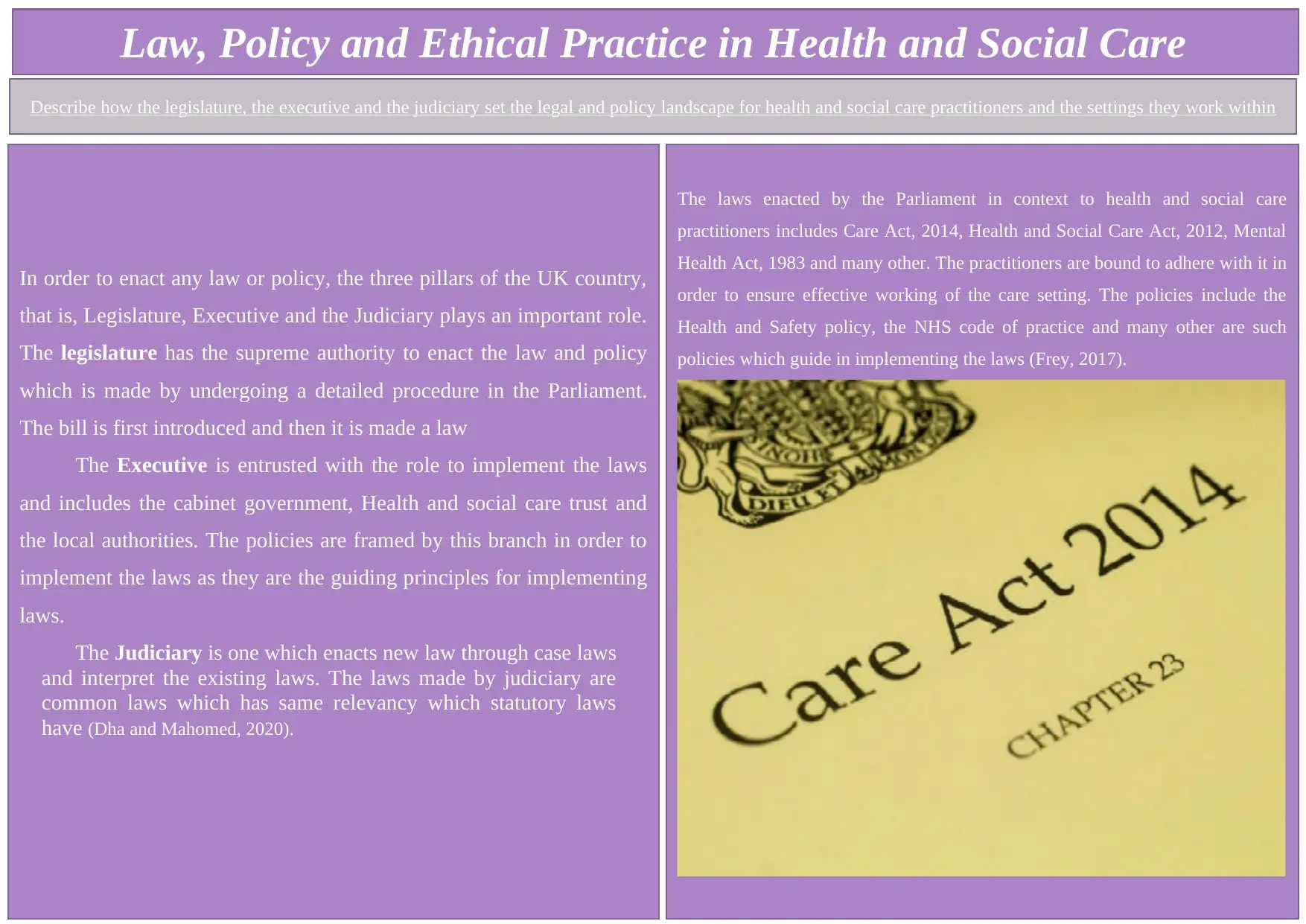
Describe how the legislature, the executive and the judiciary set the legal and policy landscape for health and social care practitioners and the settings they work within
Law, Policy and Ethical Practice in Health and Social Care
In order to enact any law or policy, the three pillars of the UK country,
that is, Legislature, Executive and the Judiciary plays an important role.
The legislature has the supreme authority to enact the law and policy
which is made by undergoing a detailed procedure in the Parliament.
The bill is first introduced and then it is made a law
The Executive is entrusted with the role to implement the laws
and includes the cabinet government, Health and social care trust and
the local authorities. The policies are framed by this branch in order to
implement the laws as they are the guiding principles for implementing
laws.
The Judiciary is one which enacts new law through case laws
and interpret the existing laws. The laws made by judiciary are
common laws which has same relevancy which statutory laws
have (Dha and Mahomed, 2020).
The laws enacted by the Parliament in context to health and social care
practitioners includes Care Act, 2014, Health and Social Care Act, 2012, Mental
Health Act, 1983 and many other. The practitioners are bound to adhere with it in
order to ensure effective working of the care setting. The policies include the
Health and Safety policy, the NHS code of practice and many other are such
policies which guide in implementing the laws (Frey, 2017).
Law, Policy and Ethical Practice in Health and Social Care
In order to enact any law or policy, the three pillars of the UK country,
that is, Legislature, Executive and the Judiciary plays an important role.
The legislature has the supreme authority to enact the law and policy
which is made by undergoing a detailed procedure in the Parliament.
The bill is first introduced and then it is made a law
The Executive is entrusted with the role to implement the laws
and includes the cabinet government, Health and social care trust and
the local authorities. The policies are framed by this branch in order to
implement the laws as they are the guiding principles for implementing
laws.
The Judiciary is one which enacts new law through case laws
and interpret the existing laws. The laws made by judiciary are
common laws which has same relevancy which statutory laws
have (Dha and Mahomed, 2020).
The laws enacted by the Parliament in context to health and social care
practitioners includes Care Act, 2014, Health and Social Care Act, 2012, Mental
Health Act, 1983 and many other. The practitioners are bound to adhere with it in
order to ensure effective working of the care setting. The policies include the
Health and Safety policy, the NHS code of practice and many other are such
policies which guide in implementing the laws (Frey, 2017).
Paraphrase This Document
Need a fresh take? Get an instant paraphrase of this document with our AI Paraphraser
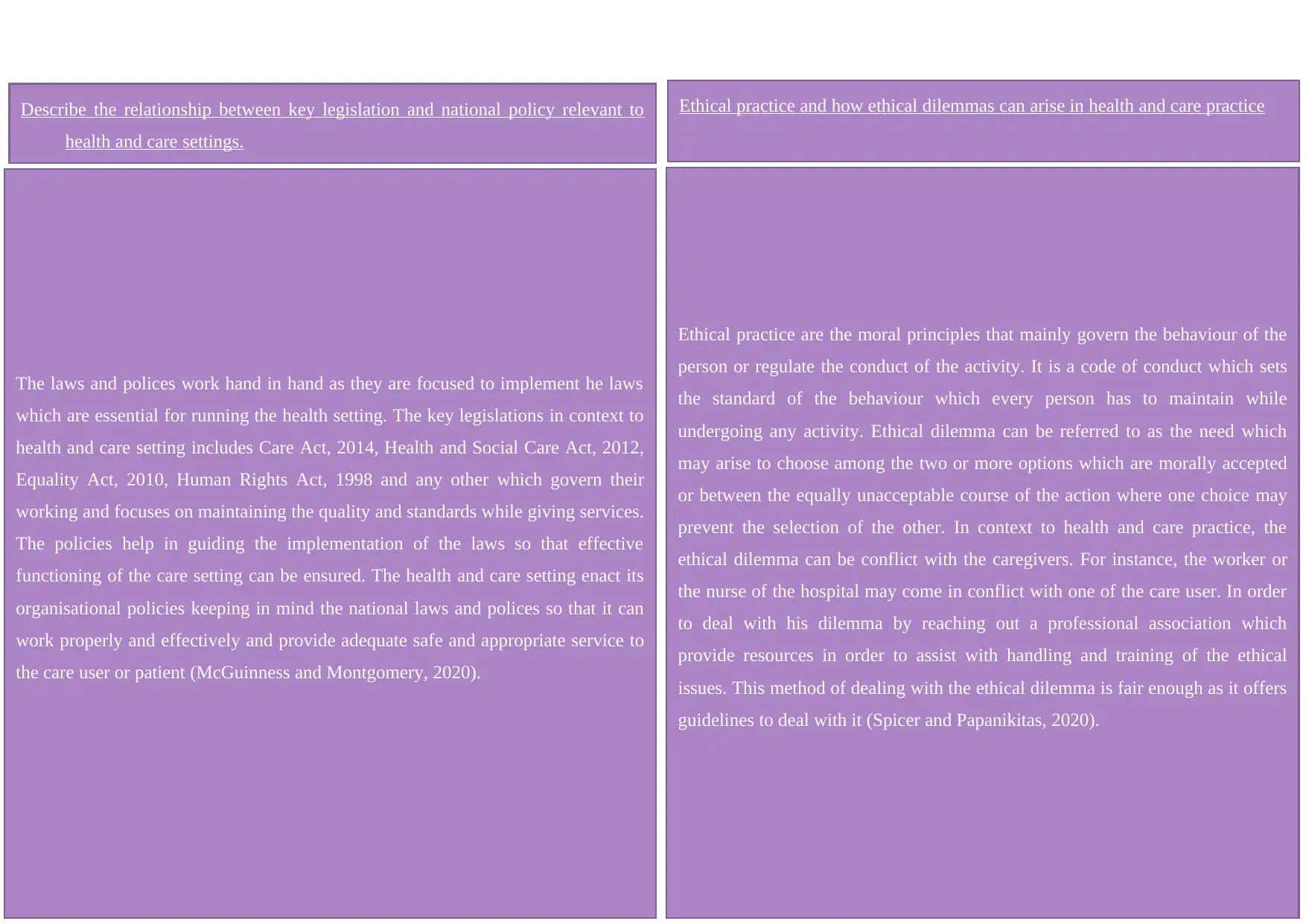
The laws and polices work hand in hand as they are focused to implement he laws
which are essential for running the health setting. The key legislations in context to
health and care setting includes Care Act, 2014, Health and Social Care Act, 2012,
Equality Act, 2010, Human Rights Act, 1998 and any other which govern their
working and focuses on maintaining the quality and standards while giving services.
The policies help in guiding the implementation of the laws so that effective
functioning of the care setting can be ensured. The health and care setting enact its
organisational policies keeping in mind the national laws and polices so that it can
work properly and effectively and provide adequate safe and appropriate service to
the care user or patient (McGuinness and Montgomery, 2020).
Ethical practice are the moral principles that mainly govern the behaviour of the
person or regulate the conduct of the activity. It is a code of conduct which sets
the standard of the behaviour which every person has to maintain while
undergoing any activity. Ethical dilemma can be referred to as the need which
may arise to choose among the two or more options which are morally accepted
or between the equally unacceptable course of the action where one choice may
prevent the selection of the other. In context to health and care practice, the
ethical dilemma can be conflict with the caregivers. For instance, the worker or
the nurse of the hospital may come in conflict with one of the care user. In order
to deal with his dilemma by reaching out a professional association which
provide resources in order to assist with handling and training of the ethical
issues. This method of dealing with the ethical dilemma is fair enough as it offers
guidelines to deal with it (Spicer and Papanikitas, 2020).
Describe the relationship between key legislation and national policy relevant to
health and care settings.
Ethical practice and how ethical dilemmas can arise in health and care practice
which are essential for running the health setting. The key legislations in context to
health and care setting includes Care Act, 2014, Health and Social Care Act, 2012,
Equality Act, 2010, Human Rights Act, 1998 and any other which govern their
working and focuses on maintaining the quality and standards while giving services.
The policies help in guiding the implementation of the laws so that effective
functioning of the care setting can be ensured. The health and care setting enact its
organisational policies keeping in mind the national laws and polices so that it can
work properly and effectively and provide adequate safe and appropriate service to
the care user or patient (McGuinness and Montgomery, 2020).
Ethical practice are the moral principles that mainly govern the behaviour of the
person or regulate the conduct of the activity. It is a code of conduct which sets
the standard of the behaviour which every person has to maintain while
undergoing any activity. Ethical dilemma can be referred to as the need which
may arise to choose among the two or more options which are morally accepted
or between the equally unacceptable course of the action where one choice may
prevent the selection of the other. In context to health and care practice, the
ethical dilemma can be conflict with the caregivers. For instance, the worker or
the nurse of the hospital may come in conflict with one of the care user. In order
to deal with his dilemma by reaching out a professional association which
provide resources in order to assist with handling and training of the ethical
issues. This method of dealing with the ethical dilemma is fair enough as it offers
guidelines to deal with it (Spicer and Papanikitas, 2020).
Describe the relationship between key legislation and national policy relevant to
health and care settings.
Ethical practice and how ethical dilemmas can arise in health and care practice
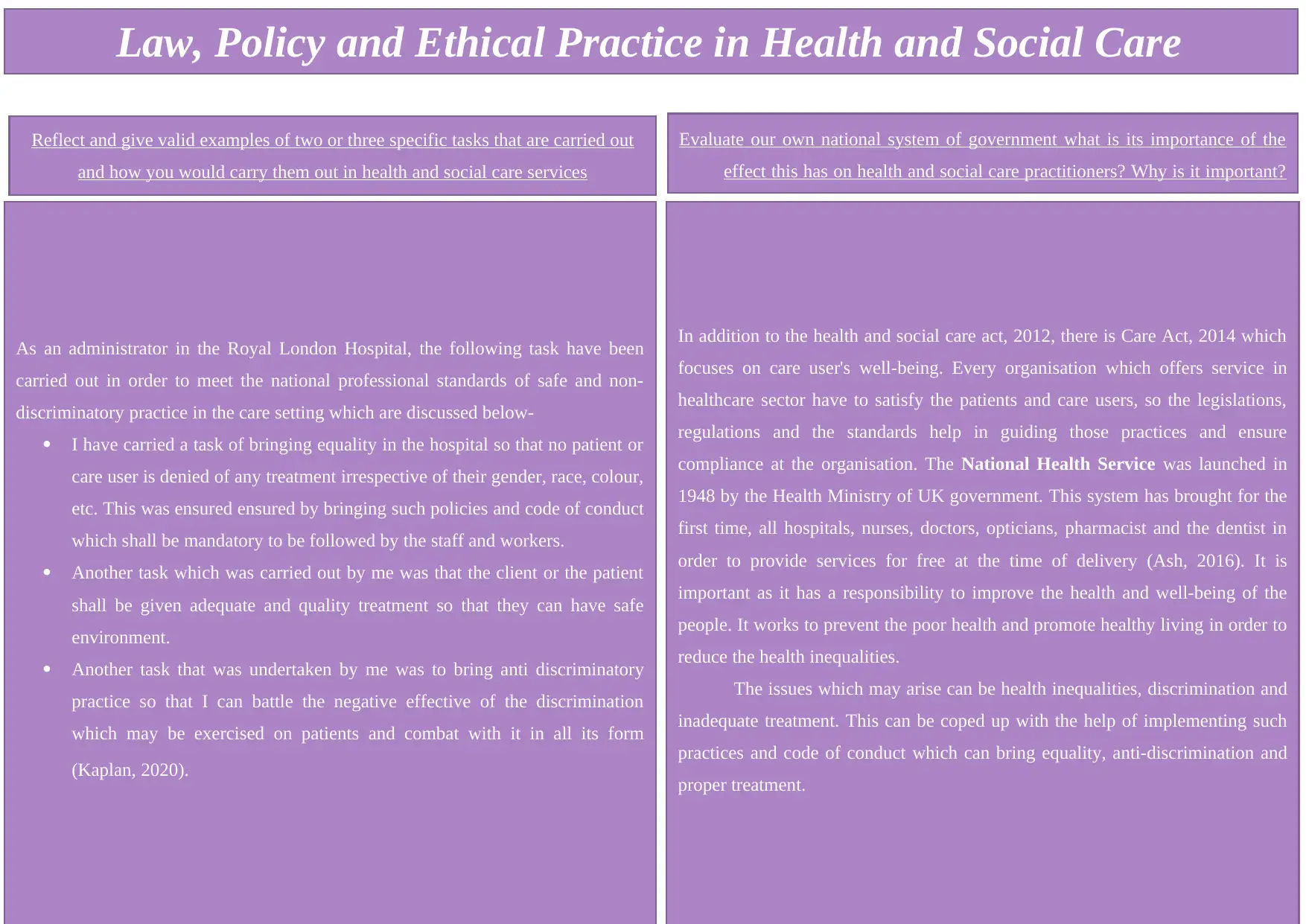
Law, Policy and Ethical Practice in Health and Social Care
As an administrator in the Royal London Hospital, the following task have been
carried out in order to meet the national professional standards of safe and non-
discriminatory practice in the care setting which are discussed below-
I have carried a task of bringing equality in the hospital so that no patient or
care user is denied of any treatment irrespective of their gender, race, colour,
etc. This was ensured ensured by bringing such policies and code of conduct
which shall be mandatory to be followed by the staff and workers.
Another task which was carried out by me was that the client or the patient
shall be given adequate and quality treatment so that they can have safe
environment.
Another task that was undertaken by me was to bring anti discriminatory
practice so that I can battle the negative effective of the discrimination
which may be exercised on patients and combat with it in all its form
(Kaplan, 2020).
In addition to the health and social care act, 2012, there is Care Act, 2014 which
focuses on care user's well-being. Every organisation which offers service in
healthcare sector have to satisfy the patients and care users, so the legislations,
regulations and the standards help in guiding those practices and ensure
compliance at the organisation. The National Health Service was launched in
1948 by the Health Ministry of UK government. This system has brought for the
first time, all hospitals, nurses, doctors, opticians, pharmacist and the dentist in
order to provide services for free at the time of delivery (Ash, 2016). It is
important as it has a responsibility to improve the health and well-being of the
people. It works to prevent the poor health and promote healthy living in order to
reduce the health inequalities.
The issues which may arise can be health inequalities, discrimination and
inadequate treatment. This can be coped up with the help of implementing such
practices and code of conduct which can bring equality, anti-discrimination and
proper treatment.
Reflect and give valid examples of two or three specific tasks that are carried out
and how you would carry them out in health and social care services
Evaluate our own national system of government what is its importance of the
effect this has on health and social care practitioners? Why is it important?
What does it do? What issues can arise? What do you think could be
As an administrator in the Royal London Hospital, the following task have been
carried out in order to meet the national professional standards of safe and non-
discriminatory practice in the care setting which are discussed below-
I have carried a task of bringing equality in the hospital so that no patient or
care user is denied of any treatment irrespective of their gender, race, colour,
etc. This was ensured ensured by bringing such policies and code of conduct
which shall be mandatory to be followed by the staff and workers.
Another task which was carried out by me was that the client or the patient
shall be given adequate and quality treatment so that they can have safe
environment.
Another task that was undertaken by me was to bring anti discriminatory
practice so that I can battle the negative effective of the discrimination
which may be exercised on patients and combat with it in all its form
(Kaplan, 2020).
In addition to the health and social care act, 2012, there is Care Act, 2014 which
focuses on care user's well-being. Every organisation which offers service in
healthcare sector have to satisfy the patients and care users, so the legislations,
regulations and the standards help in guiding those practices and ensure
compliance at the organisation. The National Health Service was launched in
1948 by the Health Ministry of UK government. This system has brought for the
first time, all hospitals, nurses, doctors, opticians, pharmacist and the dentist in
order to provide services for free at the time of delivery (Ash, 2016). It is
important as it has a responsibility to improve the health and well-being of the
people. It works to prevent the poor health and promote healthy living in order to
reduce the health inequalities.
The issues which may arise can be health inequalities, discrimination and
inadequate treatment. This can be coped up with the help of implementing such
practices and code of conduct which can bring equality, anti-discrimination and
proper treatment.
Reflect and give valid examples of two or three specific tasks that are carried out
and how you would carry them out in health and social care services
Evaluate our own national system of government what is its importance of the
effect this has on health and social care practitioners? Why is it important?
What does it do? What issues can arise? What do you think could be
⊘ This is a preview!⊘
Do you want full access?
Subscribe today to unlock all pages.

Trusted by 1+ million students worldwide
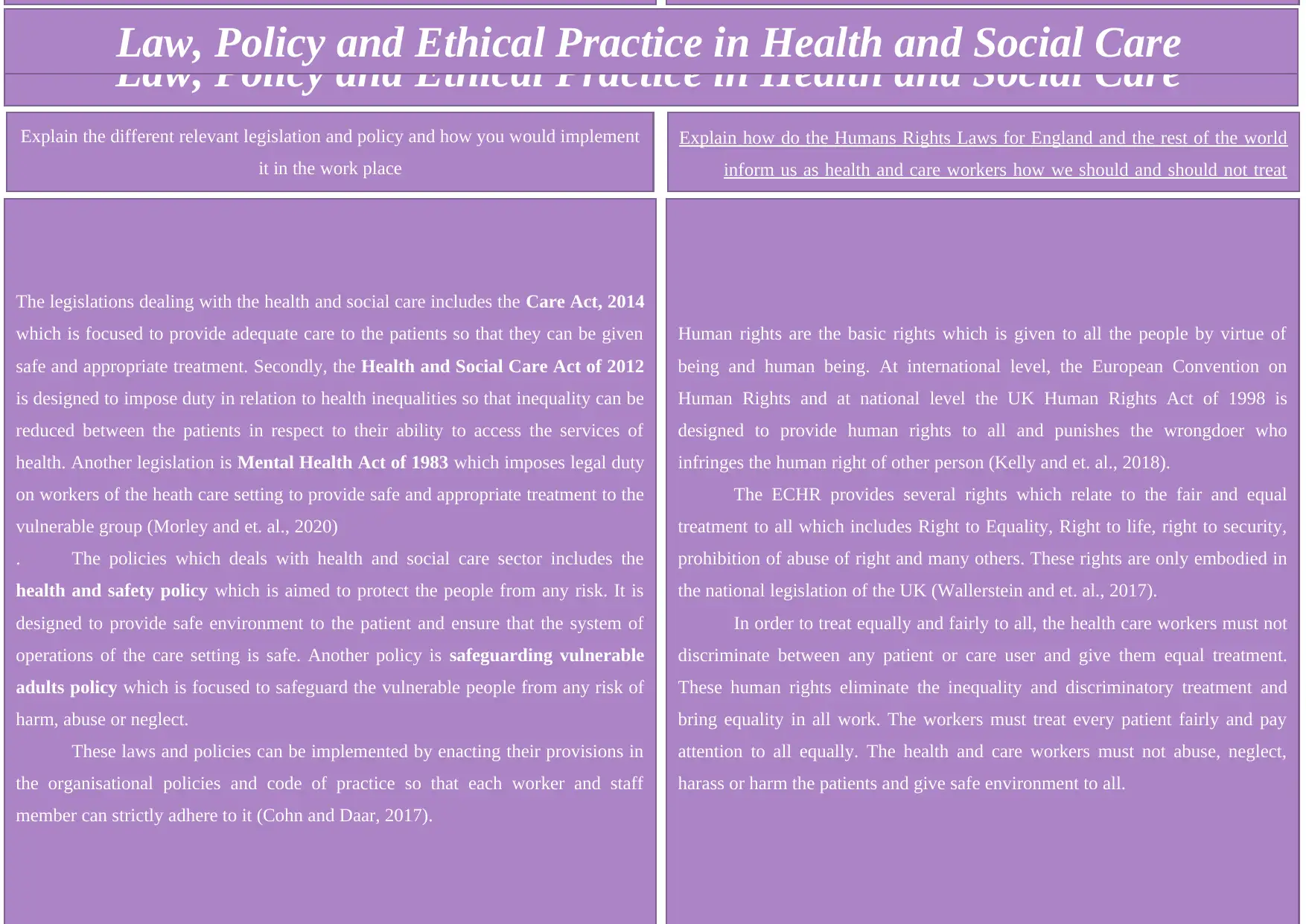
Law, Policy and Ethical Practice in Health and Social Care
The legislations dealing with the health and social care includes the Care Act, 2014
which is focused to provide adequate care to the patients so that they can be given
safe and appropriate treatment. Secondly, the Health and Social Care Act of 2012
is designed to impose duty in relation to health inequalities so that inequality can be
reduced between the patients in respect to their ability to access the services of
health. Another legislation is Mental Health Act of 1983 which imposes legal duty
on workers of the heath care setting to provide safe and appropriate treatment to the
vulnerable group (Morley and et. al., 2020)
. The policies which deals with health and social care sector includes the
health and safety policy which is aimed to protect the people from any risk. It is
designed to provide safe environment to the patient and ensure that the system of
operations of the care setting is safe. Another policy is safeguarding vulnerable
adults policy which is focused to safeguard the vulnerable people from any risk of
harm, abuse or neglect.
These laws and policies can be implemented by enacting their provisions in
the organisational policies and code of practice so that each worker and staff
member can strictly adhere to it (Cohn and Daar, 2017).
Human rights are the basic rights which is given to all the people by virtue of
being and human being. At international level, the European Convention on
Human Rights and at national level the UK Human Rights Act of 1998 is
designed to provide human rights to all and punishes the wrongdoer who
infringes the human right of other person (Kelly and et. al., 2018).
The ECHR provides several rights which relate to the fair and equal
treatment to all which includes Right to Equality, Right to life, right to security,
prohibition of abuse of right and many others. These rights are only embodied in
the national legislation of the UK (Wallerstein and et. al., 2017).
In order to treat equally and fairly to all, the health care workers must not
discriminate between any patient or care user and give them equal treatment.
These human rights eliminate the inequality and discriminatory treatment and
bring equality in all work. The workers must treat every patient fairly and pay
attention to all equally. The health and care workers must not abuse, neglect,
harass or harm the patients and give safe environment to all.
Law, Policy and Ethical Practice in Health and Social Care
Explain the different relevant legislation and policy and how you would implement
it in the work place
Explain how do the Humans Rights Laws for England and the rest of the world
inform us as health and care workers how we should and should not treat
individuals in fair and equal ways
The legislations dealing with the health and social care includes the Care Act, 2014
which is focused to provide adequate care to the patients so that they can be given
safe and appropriate treatment. Secondly, the Health and Social Care Act of 2012
is designed to impose duty in relation to health inequalities so that inequality can be
reduced between the patients in respect to their ability to access the services of
health. Another legislation is Mental Health Act of 1983 which imposes legal duty
on workers of the heath care setting to provide safe and appropriate treatment to the
vulnerable group (Morley and et. al., 2020)
. The policies which deals with health and social care sector includes the
health and safety policy which is aimed to protect the people from any risk. It is
designed to provide safe environment to the patient and ensure that the system of
operations of the care setting is safe. Another policy is safeguarding vulnerable
adults policy which is focused to safeguard the vulnerable people from any risk of
harm, abuse or neglect.
These laws and policies can be implemented by enacting their provisions in
the organisational policies and code of practice so that each worker and staff
member can strictly adhere to it (Cohn and Daar, 2017).
Human rights are the basic rights which is given to all the people by virtue of
being and human being. At international level, the European Convention on
Human Rights and at national level the UK Human Rights Act of 1998 is
designed to provide human rights to all and punishes the wrongdoer who
infringes the human right of other person (Kelly and et. al., 2018).
The ECHR provides several rights which relate to the fair and equal
treatment to all which includes Right to Equality, Right to life, right to security,
prohibition of abuse of right and many others. These rights are only embodied in
the national legislation of the UK (Wallerstein and et. al., 2017).
In order to treat equally and fairly to all, the health care workers must not
discriminate between any patient or care user and give them equal treatment.
These human rights eliminate the inequality and discriminatory treatment and
bring equality in all work. The workers must treat every patient fairly and pay
attention to all equally. The health and care workers must not abuse, neglect,
harass or harm the patients and give safe environment to all.
Law, Policy and Ethical Practice in Health and Social Care
Explain the different relevant legislation and policy and how you would implement
it in the work place
Explain how do the Humans Rights Laws for England and the rest of the world
inform us as health and care workers how we should and should not treat
individuals in fair and equal ways
Paraphrase This Document
Need a fresh take? Get an instant paraphrase of this document with our AI Paraphraser
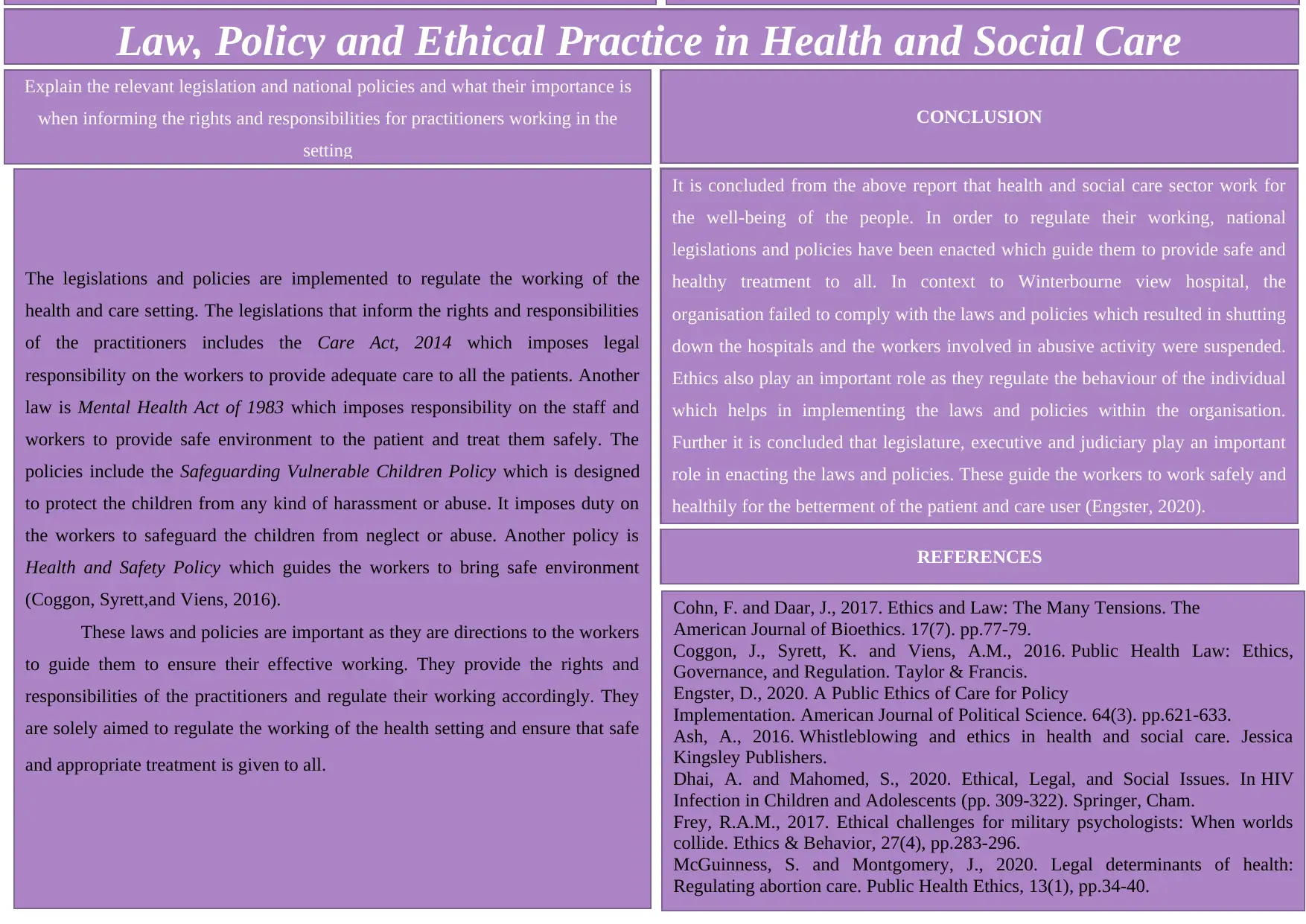
The legislations and policies are implemented to regulate the working of the
health and care setting. The legislations that inform the rights and responsibilities
of the practitioners includes the Care Act, 2014 which imposes legal
responsibility on the workers to provide adequate care to all the patients. Another
law is Mental Health Act of 1983 which imposes responsibility on the staff and
workers to provide safe environment to the patient and treat them safely. The
policies include the Safeguarding Vulnerable Children Policy which is designed
to protect the children from any kind of harassment or abuse. It imposes duty on
the workers to safeguard the children from neglect or abuse. Another policy is
Health and Safety Policy which guides the workers to bring safe environment
(Coggon, Syrett,and Viens, 2016).
These laws and policies are important as they are directions to the workers
to guide them to ensure their effective working. They provide the rights and
responsibilities of the practitioners and regulate their working accordingly. They
are solely aimed to regulate the working of the health setting and ensure that safe
and appropriate treatment is given to all.
Law, Policy and Ethical Practice in Health and Social Care
Explain the relevant legislation and national policies and what their importance is
when informing the rights and responsibilities for practitioners working in the
setting
CONCLUSION
It is concluded from the above report that health and social care sector work for
the well-being of the people. In order to regulate their working, national
legislations and policies have been enacted which guide them to provide safe and
healthy treatment to all. In context to Winterbourne view hospital, the
organisation failed to comply with the laws and policies which resulted in shutting
down the hospitals and the workers involved in abusive activity were suspended.
Ethics also play an important role as they regulate the behaviour of the individual
which helps in implementing the laws and policies within the organisation.
Further it is concluded that legislature, executive and judiciary play an important
role in enacting the laws and policies. These guide the workers to work safely and
healthily for the betterment of the patient and care user (Engster, 2020).
REFERENCES
Cohn, F. and Daar, J., 2017. Ethics and Law: The Many Tensions. The
American Journal of Bioethics. 17(7). pp.77-79.
Coggon, J., Syrett, K. and Viens, A.M., 2016. Public Health Law: Ethics,
Governance, and Regulation. Taylor & Francis.
Engster, D., 2020. A Public Ethics of Care for Policy
Implementation. American Journal of Political Science. 64(3). pp.621-633.
Ash, A., 2016. Whistleblowing and ethics in health and social care. Jessica
Kingsley Publishers.
Dhai, A. and Mahomed, S., 2020. Ethical, Legal, and Social Issues. In HIV
Infection in Children and Adolescents (pp. 309-322). Springer, Cham.
Frey, R.A.M., 2017. Ethical challenges for military psychologists: When worlds
collide. Ethics & Behavior, 27(4), pp.283-296.
McGuinness, S. and Montgomery, J., 2020. Legal determinants of health:
Regulating abortion care. Public Health Ethics, 13(1), pp.34-40.
health and care setting. The legislations that inform the rights and responsibilities
of the practitioners includes the Care Act, 2014 which imposes legal
responsibility on the workers to provide adequate care to all the patients. Another
law is Mental Health Act of 1983 which imposes responsibility on the staff and
workers to provide safe environment to the patient and treat them safely. The
policies include the Safeguarding Vulnerable Children Policy which is designed
to protect the children from any kind of harassment or abuse. It imposes duty on
the workers to safeguard the children from neglect or abuse. Another policy is
Health and Safety Policy which guides the workers to bring safe environment
(Coggon, Syrett,and Viens, 2016).
These laws and policies are important as they are directions to the workers
to guide them to ensure their effective working. They provide the rights and
responsibilities of the practitioners and regulate their working accordingly. They
are solely aimed to regulate the working of the health setting and ensure that safe
and appropriate treatment is given to all.
Law, Policy and Ethical Practice in Health and Social Care
Explain the relevant legislation and national policies and what their importance is
when informing the rights and responsibilities for practitioners working in the
setting
CONCLUSION
It is concluded from the above report that health and social care sector work for
the well-being of the people. In order to regulate their working, national
legislations and policies have been enacted which guide them to provide safe and
healthy treatment to all. In context to Winterbourne view hospital, the
organisation failed to comply with the laws and policies which resulted in shutting
down the hospitals and the workers involved in abusive activity were suspended.
Ethics also play an important role as they regulate the behaviour of the individual
which helps in implementing the laws and policies within the organisation.
Further it is concluded that legislature, executive and judiciary play an important
role in enacting the laws and policies. These guide the workers to work safely and
healthily for the betterment of the patient and care user (Engster, 2020).
REFERENCES
Cohn, F. and Daar, J., 2017. Ethics and Law: The Many Tensions. The
American Journal of Bioethics. 17(7). pp.77-79.
Coggon, J., Syrett, K. and Viens, A.M., 2016. Public Health Law: Ethics,
Governance, and Regulation. Taylor & Francis.
Engster, D., 2020. A Public Ethics of Care for Policy
Implementation. American Journal of Political Science. 64(3). pp.621-633.
Ash, A., 2016. Whistleblowing and ethics in health and social care. Jessica
Kingsley Publishers.
Dhai, A. and Mahomed, S., 2020. Ethical, Legal, and Social Issues. In HIV
Infection in Children and Adolescents (pp. 309-322). Springer, Cham.
Frey, R.A.M., 2017. Ethical challenges for military psychologists: When worlds
collide. Ethics & Behavior, 27(4), pp.283-296.
McGuinness, S. and Montgomery, J., 2020. Legal determinants of health:
Regulating abortion care. Public Health Ethics, 13(1), pp.34-40.
1 out of 5
Related Documents
Your All-in-One AI-Powered Toolkit for Academic Success.
+13062052269
info@desklib.com
Available 24*7 on WhatsApp / Email
![[object Object]](/_next/static/media/star-bottom.7253800d.svg)
Unlock your academic potential
Copyright © 2020–2026 A2Z Services. All Rights Reserved. Developed and managed by ZUCOL.




